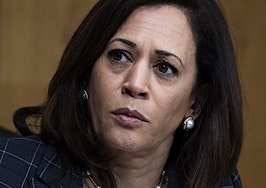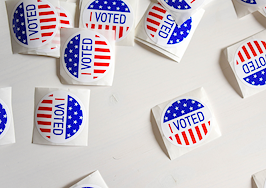The presidential election has plenty of implications for the housing market, especially during a year when headlines about Great Depression-level unemployment rates and a potential wave of evictions and foreclosures have dominated everyone’s news feeds.
Despite the rollercoaster of a year, Redfin’s latest survey revealed that Americans remained relatively unfazed when it comes to their buying and selling plans over the next 12 months. In a survey of more than 1,400 respondents, only 22 percent said the election is impacting their real estate plans — a 10 percent decrease from last year.
“The drop from last year is likely due to the pandemic, which seems to be outweighing the election as a factor for homebuyers and sellers,” Redfin explained in a press release. “Election concerns are unlikely to have a major impact on the housing market, partly because a portion of those people will move forward with their plans to buy and/or sell once the election has passed.”
Of those who said the election will sway their plans, 13 percent said it’s making them more hesitant to buy or sell a home. On the other hand, nine percent said it’s making them less hesitant to begin or move forward with a transaction.
Although survey respondents seem to be relatively unshaken by the election, Silicon Valley-based Redfin agent Alisha Pruitt told Redfin that buyers, more now than ever, have been asking about politics and how each candidate’s policy could impact their plans.
“Almost all the buyers I work with ask how the election could impact their home purchase,” Pruitt said in a written statement. “I don’t have a crystal ball, but presidential elections have never seemed to affect the housing market much in the six election cycles I’ve been a real estate agent.”
Even though politics has moved up the list of concerns for Pruitt’s clients, she said the pandemic still has the greatest impact on her buyers who are looking to take advantage of low-interest rates while they last.
“The pandemic is having a much bigger impact, with low mortgage rates motivating buyers who want more space to work from home,” she said.
Seventy-five percent of buyers and 50 percent of sellers said the coronavirus has affected their homebuying and selling plans for the next 12 months, with 43 percent of buyers saying they plan to “buy a home later than originally planned.” Meanwhile, another 34 percent said they’ve accelerated their homebuying goals.
Sellers are coming to the same conclusion as buyers, with the majority deciding to slow (21 percent) or cancel (10 percent) their listing plans. However, 19 percent of sellers said they’re charging forward and are preparing to sell sooner than expected.
“Some home sellers—and buyers, to a lesser extent—are delaying their plans because of all the stress and uncertainty in the world, including the divisiveness surrounding the presidential election,” Louisville-based Redfin agent Danielle Field added in the report. “They don’t want to add one more stressful experience to their lives.”
“I’m hopeful that once the election is over and there’s finally some certainty in this country, people will start putting their homes on the market again, creating more inventory for buyers,” Field added.
However, Field may have to wait a few months for a post-election sales rebound. According to past data, home sales drop an average of 1.5 percent in November and December and rebound by the same amount in the following January. Also, there’s not much of a pre-election rush with home sales rising an average of 0.4 percent in October.
Even with a contentious Election Day on the horizon, Redfin economist Taylor Marr said the housing market will remain resilient as 2020’s home sales pace is on track to reach 6.4 million units sold.
“2020 has been unpredictable in almost every way, and the housing market is no exception,” Marr said in a prepared statement. “Any expectations about the housing market from the beginning of the year—or from the beginning of the pandemic in April, when home sales nearly ground to a halt—have been shattered as low mortgage rates and the desire for additional space drives an uptick in sales.”
“Home sales typically don’t rise or fall much during the months surrounding a presidential election compared with those same months in non-election years, and although the upcoming election is happening at a particularly tumultuous time in our country’s history, I expect the trend to remain the same,” he added. “While it’s possible this year’s election results may be up in the air for a few weeks and the delay could cause some people to hold off on buying or selling a home, the impact would likely be short-lived.”








